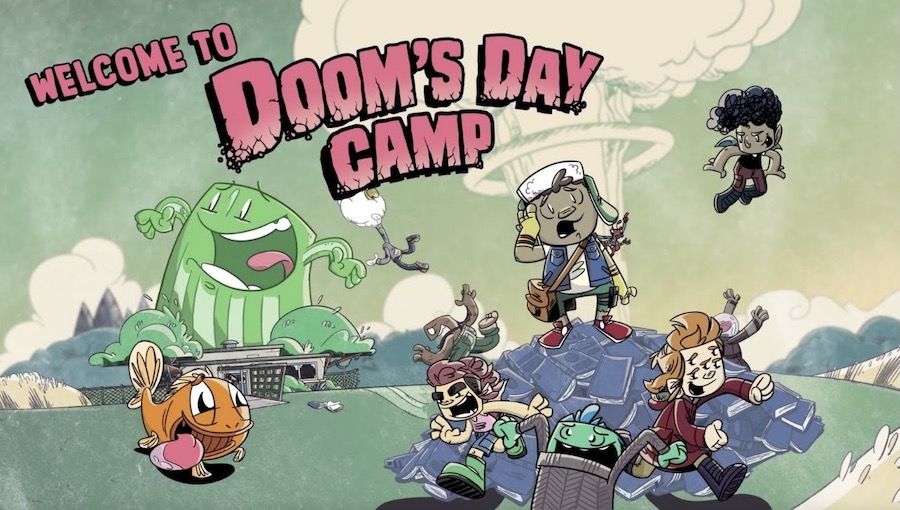When the apocalypse happens, it takes everything you have and everything you are just to survive. The ones who make it are the ones with the strength to face whatever dangers are out there and the skills to find things like food and shelter. There’s no room for dreaming or imagination.
Eventually, though, you find that maybe those things are important after all. And that maybe the time has come to do more than survive. It’s time to live. This is something I’ve thought about for a long time, and it seems to be the message of Doom’s Day Camp.
The apocalypse came. Civilization was lost. The survivors have formed packs, wherein they hunt for food and try to stave off whatever might be hunting THEM for food. On the plus side, most likely due to nuclear fallout, now everyone is born with some sort of superpower or special ability.
Well, almost everyone. Doom Thorax, son of pack leader and great warrior Grizzly Thorax, was born a “normo,” with no abilities. He does have one skill, though: He can read. While his father and his super-strong sister Disaster (Dizy for short) go out hunting and fighting monsters, Doom would rather be reading books with his best (and only) friend, an intelligent talking ant named Eisenhower.
Unfortunately, when trouble strikes, Grizzly and the other adults of the pack must go and investigate, leaving Doom in charge of the other kids until they return. Nobody is happy about this arrangement—least of all Doom—but with the resources they’ve found at an old, abandoned day camp, including a whole slew of books on every subject, hopefully, he can rise to the occasion and become, not a warrior, but a different kind of leader. The kind of leader they need—at least until their parents come back.
Unfortunately, by the second volume, their parents still aren’t back. Doom’s Day Camp is thriving, taking in more and more kids from the surrounding area—whose parents have all disappeared as well, hunting the same monster. Now, it’s time for Doom and a few of his powered peers to go out searching for them.
Throughout both volumes of the graphic novel series (Doom’s Day Camp and Doom’s Day Camp: The Story Eater), whatever danger comes their way, there’s always a book that can help. The trick is finding the right book—and it’s often not the one you’d expect. Throughout Doom’s Day Camp, most of the books are non-fiction and how-to books. There are DIY books to help fix up the day camp, make basic repairs, and even upgrade it to be a pretty nice place to live. Other books provide clues to helping Doom help the other kids control their various powers, from weather phenomena to telekinesis to mud-based indigestion. At one point, he even saves the day with a joke book.
In the second volume, The Story Eater, Doom again needs to use books to solve various problems—but with a marked tonal shift. Now, it seems that instead of how-to and DIY, most of the books he needs are stories: a story about a detective to help them find the clues they need, an emotional story to provide one of their team with an outlet for his powers, and even a superhero comic to inspire someone who doesn’t feel brave enough on their adventure.
The tonal shift makes sense for this issue, because, as its title implies, our heroes find themselves fighting a monster who literally eats stories—stealing the memories right out of people’s heads, leaving them but hollow husks. The message throughout both volumes is clear: Books and stories are what help us along our journey and help make us who we are. You’re never really lost, as long as you’ve got the right book. This is a sentiment that I can get behind.
This may be an apocalyptic story about fighting various monsters, but the tone throughout is funny and silly and weird. The characters are unique and a lot of fun, both in terms of their powers and their personalities. There are also plenty of sight gags, fun references, and a few terrible puns. Kids will love these comics, and adults will enjoy them, too—really, anyone who knows the power of a good book. If you like all-ages comics with silly humor and a heavy dose of apocalyptic weirdness, then you’ll want to check out Doom’s Day Camp and The Story Eater.
Creative Team: Joshua Hauke (writer, creator), Aaron Polk (colorist), Christopher Hernandez (editor), and Kristie Radwilowicz (design)
Publisher: Penguin Random House
Click here to purchase Doom’s Day Camp and here to purchase The Story Eater.

